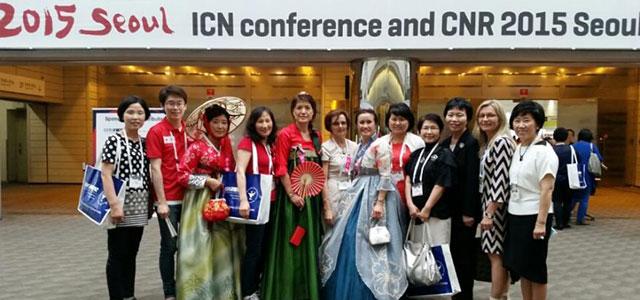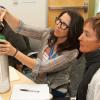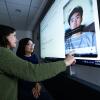
ICN conference attendees gather for the opening in Seoul (photo by KH Ruetten).
Understanding the Role of U.S. Graduate Schools of Nursing in Global Health
In June, the International Council of Nurses (ICN) and Council of National Nursing Association Representatives (CNR) conference took place in Seoul, South Korea, with the theme “Global Citizen, Global Nursing.” The conference is an international gathering where thousands of nurses explore cross-cultural experiences and build relationships for academic, clinical and research exchanges.
Five faculty members from UCSF School of Nursing’s newly established Center for Global Health attended the conference – advancing that part of the center’s mission aimed at collaborating with academic and community partners both locally and around the world to promote training and capacity building of their local nurse workforce. Below, the five faculty members describe what they believe are the key takeaways from the conference.
This year’s ICN and CNR conference took place during the height of the Middle East respiratory syndrome (MERS) outbreak in the Republic of Korea. Concerns about MERS infused the conference theme – Global Citizen, Global Nursing – with a heightened urgency, as attendees focused intently on the continued need for expanding global health knowledge among nurses worldwide.
The urgency also deepened our understanding of the absolute necessity of these international exchanges of nursing research, clinical practice and advanced education – as well as the ways US graduate schools of nursing can better contribute to improving population health around the world.
One thing that opened our eyes was when our team hosted a reception for colleagues and friends of the School. Many of the more than 125 attendees – who came from all corners of the globe – were graduates of our School’s master’s and doctoral programs. As we listened to and engaged in conversations with them, we were struck by the richness of these exchanges and the ways they can benefit faculty, students and global health. The many different and critical roles our colleagues have assumed after returning to their home countries were especially moving.
Some have become faculty at schools of nursing that provide education from the undergraduate to the doctoral level – including training nursing colleagues to become advanced practice nurses, an uncommon role in most countries outside of the US or Great Britain. Others spoke of how UCSF did more than offer them outstanding instruction; it also gave them the chance to become a more well-rounded global citizen by learning and publishing scientific papers in English. In turn, many have returned home and begun to teach courses in English for their domestic and international students. Still others, who came to UCSF as visiting professors or postdoctoral scholars, have returned home to begin their programs of research and grow global research opportunities, often in collaboration with UCSF mentors.
The depth and breadth of the work they do makes us feel gratified that the learning they acquired here has had such a positive effect on global population health, but it was also sobering. It made us acutely aware of our responsibility to ensure our curriculum is not only scientifically and clinically rigorous, but also truly sensitive to global health needs.
This brings us to what we believe is the essential takeaway from this year’s conference. Yes, UCSF and other US graduate schools of nursing are seen as pioneers in global health nursing – and that was in evidence here. For example, Susan Chapman presented about how to develop curricula to teach nurses to lead in global health policy. And Mary Foley is on the board of trustees of the Commission on Graduates of Foreign Nursing Schools International, which sponsored a nursing workforce update from across the globe.
Yet the truth is that our programs and our understanding of key global health issues are and should be shaped by our exchanges with our students, visiting scholars, alumni and other international colleagues – and we must be very attentive to what they bring to the table. In some areas, such as disaster preparation, our colleagues in other countries are far ahead of the US. For example, Sheila Bonito from the Philippines and Roxana Obando Zegarra from Peru did an outstanding job of presenting the role that nurses play during disaster preparation, including coping with hurricanes and, more generally, the effects of climate change.
Thus, we must constantly be sensitive to the fact that the expert nurses and nurse scientists who come here and then return to their own countries have important clinical, academic and research experiences that are uniquely their own. We must stay in touch and continue to collaborate with and learn from them if we are to continually improve how we train the global nursing workforce.
That, in a nutshell, is the value of the ICN, its conferences and the establishment of a Center for Global Health at our School: they all foster continued and sincere collaboration, which is the hallmark of global citizenship and the key to making real and sustained improvements in global health.



